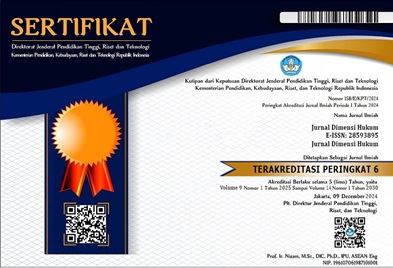ANALISIS NETRALITAS DAN INDEPENDENSI KPK TERHADAP KASUS KORUPSI DEWAN PERWAKILAN RAKYAT
Kata Kunci:
Independensi KPK, Revisi UU KPK 2019, Pemberantasan KorupsiAbstrak
KPK dibentuk dengan tujuan pembentukan awal sebagai lembaga yang Independen. Hal ini merupakan tujuan dari dibentuknya KPK agar tidak terpengaruh oleh Lembaga negara lainya atau terpengaruh oleh kekuasaan pemerintah yang sedang berkuasa, namun setelah revisi UU KPK Nomor 19 tahun 2019 ini dinilai sangat melemahkan KPK dalam melakukan tindakan pemberantasan korupsi karena terdapat kurang lebih 26 poin kewenangannya yang berkurang termasuk dalam hal penyadapan dan independensi, KPK melalui juru bicaranya mengatakan banyak sekali ketidaksinkronan pasal demi pasal, pada UU Nomor 19 tahun 2019 dalam implikasinya juga berpengaruh sebagaimana ruang gerak semakin terbatas dan tidak bebas dari pengaruh kekuasaan lain serta agenda awal didirikannya KPK semakin tidak terarah. Terkadang KPK dijadikan alat oleh kekuasaan untuk menakuti orang-orang yang tidak sejalan apa yang diinginkan kekuasaan dengan cara memberikan surat perintah penyidikan (sprindik) maka dari itu prinsip awal yaitu Lembaga independen negara dan lembaga anti korupsi semakin tidak relevan dan dinilai tebang pilih apalagi dalam penanganan kasus korupsi yang menjerat anggota DPR sering sekali penyidik KPK merasa ketakutan. Dalam revisi UU ini KPK yang awalnya lembaga non masuk dalam bidang eksekutif. Padahal pemegang kekuasaan eksekutif paling berpengaruh adalah Presiden yang sudah mempunyai Lembaga penindakan korupsi lain yaitu Kepolisian dan Kejaksaan maka revisi UU tersebut semakin menjadikan Presiden mempunyai kekuasaan yang semakin super power.
Komisi Pemberantasan Korupsi (KPK) was formed with the aim of its initial formation as an independent institution. This is the purpose of the establishment of the KPK so that it is not influenced by other state institutions or influenced by the power of the government in power, but after the revision of KPK Law Number 19 of 2019, it is considered to greatly weaken the KPK in carrying out corruption eradication actions because there are approximately 26 points of reduced authority including in terms of wiretapping and independence, the KPK through its spokesperson said that there were many inconsistencies article by article, in Law Number 19 of 2019 in its implications it also has an effect as the space for movement is increasingly limited and not free from the influence of other powers and the original agenda of establishing the KPK is increasingly undirected. Sometimes the KPK is used as a tool by power to scare people who are not in line with what power wants by giving an investigation warrant (sprindik), therefore the initial principle, namely an independent state institution and an anti-corruption institution, is increasingly irrelevant and is considered selective, especially in handling corruption cases that ensnare members of the DPR, KPK investigators often feel scared. In the revision of this law, the KPK, which was originally a non-institution, is included in the executive sector. Whereas the most influential holder of executive power is the President, who already has other corruption prosecution institutions, namely the Police and the Attorney General's Office, the revision of the law makes the President even more powerful.





